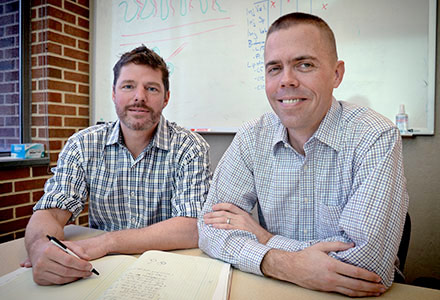UNC-Duke Collaboration Probes the Depths of Gut Health
The key to physical and mental wellbeing could lie in your gut. The cells that line your digestive tract – all thirty feet of it – do more than just help your body digest food and get rid of waste. They stimulate your immunity, process toxins and pharmaceuticals, and even release hormones to ease anxiety and depression. But they aren’t all human.

The gut contains trillions of microbes, which are estimated to outnumber human cells by ten to one. Understanding how these diverse microbial communities – collectively known as the microbiome – influence human health is one of the next great frontiers for scientists, and a challenging one at that.
UNC stem cell expert Scott Magness, PhD, and Duke microbiome researcher John Rawls, PhD, are using a $50,000 grant to develop a new technology to study the co-dependent relationship between the human gut and its resident bacteria. The funding is part of an effort by the neighboring CTSAs to foster collaborations that accelerate the pace of biomedical research.
Rawls has spent years studying the impact of the microbiome on gut physiology, primarily in model organisms like the zebrafish. Using these tiny aquarium fish, he has shown that specific bacteria can affect the gut’s ability to absorb dietary fats, a finding that could one day lead to new treatments for obesity and malnutrition. Eager to see if what he found in fish also held true in humans, Rawls looked up the road for help.
“Very few institutions have the access that we do to the full spectrum of human intestinal tissue,” said Magness, an associate professor at the UNC School of Medicine. Through Carolina Donor Services, Magness has been able to procure transplant-grade organs that would otherwise be discarded. “When there is a donor, some organs get sent off for transplant, but the intestine and colon are typically left because intestinal transplants are so rare. We take these tissues back to the laboratory and use the entire length of tissue in our experiments. This is important because each region of the intestine houses different types of bacteria and carries out different functions.”
Magness recently developed a way to harvest individual stem cells from these organs and turn them into fully developed tissue structures called mini-guts. These structures -- each no bigger than the head of a pin – mimic many of the features of a full-blown gut, even sporting a hollow interior to support the growth of microbes. As many as 15,000 of these structures are then packed onto a fabricated device the size of a quarter, creating what amounts to a “gut-on-a-chip.”
With the new grant, Magness and Rawls plan to pump bacteria and their products into the insides of each mini-gut to test how different microbes can affect gut health. Performing these microscopic injections is no small feat, and perfecting the technique will likely take many months. But the researchers have already shown that it is possible, and are now in the process of scaling up their approach to quickly and effectively inject the thousands of mini-guts contained on a single chip.
“An important part of this project is technology development. Once these assays are developed, they will allow us to ask a wide range of important new questions about host-microbe relationships in the human gut,” said Rawls, an associate professor at the Duke School of Medicine. “We have a few questions we want to ask first, such as how specific bacteria impact nutrient absorption, but the real implications of this project are much larger. Our work represents interactions between these two top institutions, which house many people interested in intestinal biology and gut microbes. We think that this platform will facilitate not just our laboratories’ work but also empower others in our local scientific community.”
The collaboration of Magness and Rawls is one of four to recently receive translational grants from the North Carolina Translational and Clinical Sciences (NC TraCS) Institute and the Duke University Translational Medicine Institute (DTMI). The awards place particular emphasis on basic research in a variety of disciplines that address the development of therapies, diagnostics or devices applicable to human disease and clinical trials.
UNC and Duke are the only two academic institutions in North Carolina that are members of the CTSA program, a national consortium created to improve the way biomedical research is conducted across the country. The CTSA program is funded by the National Center for Advancing Translational Sciences (NCATS), a part of the National Institutes of Health (NIH).
- Created on .